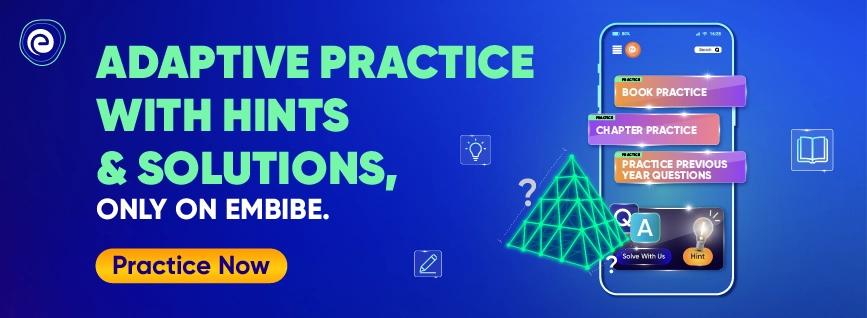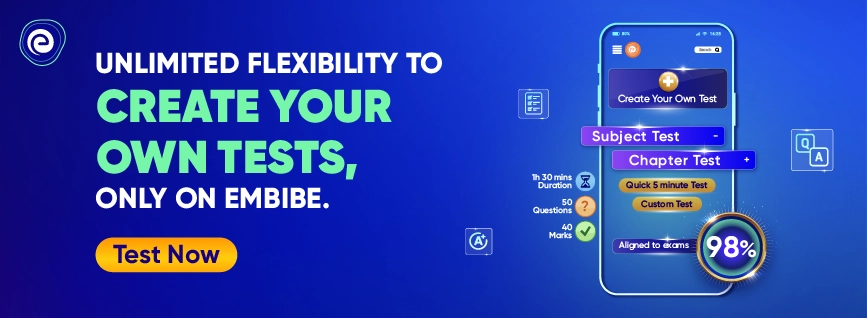- Written by gnanambigai
- Last Modified on 10-12-2024
Karnataka Board Class 8 Exam 2025
The Karnataka School Examination and Assessment Board (KSEAB) is a government body that regulates and governs Karnataka’s educational system. The board provides guidelines for conducting the examination from Classes 1 to 12. Students in respective boards must ensure that they are following the information laid out by the board and school authorities. The Karnataka Board Class 8 exam is conducted at the school level by adhering to the norms set by the board.
The board is in charge of a number of things, including prescribing the syllabi, awarding school recognition, developing courses of study and Karnataka state board textbooks, and providing guidance, support, and leadership to all of the institutes under its authority. Class 8 is the stage where students build their concepts that are useful for the higher classes. Here you will find all of the information you need for the Karnataka Board Class 8 exam.
Karnataka Board Class 8 Exam Summary
Class 8 is an important stage in a student’s life. The Karnataka Board Class 8 exams are regulated by Karnataka Secondary Education Examination Board. Since it is the main board of Karnataka board, students must ensure that they prepare for the exams carefully.
The Class 8 exams are regulated by the KSEAB. Hence, the students will need to follow the guidelines set out by the KSEAB. The school authorities usually conduct the examination for two hours. The mode of examination is offline. In the table below, we have provided complete information about KSEAB Class 8 exams.
| Features |
Details |
| Full Exam Name |
Karnataka State Board Class 8 |
| Short Exam Name |
KSEAB Class 8 |
| Conducting Body |
Karnataka School Examination and Assessment Board |
| Frequency of Conduct |
Annual |
| Exam Level |
Middle |
| Mode of Exam |
Offline |
| Exam Duration |
3 Hours |
Karnataka Board Official Website Link
https://kseab.karnataka.gov.in/english
Karnataka Board Class 8 Exam Syllabus 2025
The Karnataka Board Class 8 syllabus deals with different subjects that can be extremely helpful for the students. It is advisable that the students preparing for Karnataka board exams follow the syllabus for all sections so that they can stay ahead of their competition and score good marks in the exam. In the sections below, we are providing the Karnataka board Class 8 exam syllabus:
Karnataka Board Class 8 Mathematics Syllabus
Maths is an important subject that every student must follow diligently. Making your basics or foundations clear for Mathematics is important as it will allow you to grow in the longer run. Furthermore, these can also be helpful for clarifying your understanding for the topics in the later or higher classes.
In the table below we have provided the Class 8 Maths syllabus for Karnataka Board:
| Syllabus for Karnataka Class 8 Mathematics |
| Chapters |
Name of the chapters |
| Chapter 1 |
Rational Numbers |
| Chapter 2 |
Linear Equation in One Variable |
| Chapter 3 |
Understanding Quadrilaterals |
| Chapter 4 |
Practical Geometry |
| Chapter 5 |
Data Handling |
| Chapter 6 |
Square and Square Roots |
| Chapter 7 |
Cube and Cube Roots |
| Chapter 8 |
Comparing Quantities |
| Chapter 9 |
Algebraic Expressions and Identities |
| Chapter 10 |
Visualising Solid Shapes |
| Chapter 11 |
Mensuration |
| Chapter 12 |
Exponents and Powers |
| Chapter 13 |
Direct and Indirect Proportions |
| Chapter 14 |
Factorisation |
| Chapter 15 |
Introduction to Graphs |
| Chapter 16 |
Playing with Numbers |
Syllabus for Karnataka Class 8 Science
Science involves a lot of learning of concepts, experiments and concepts. Students must ensure that they are referring to all the concepts clearly so that they can prepare for the exams in a systematic manner.
The chapters included in the Karnataka syllabus for Class 8 Science are tabulated below:
| Syllabus for Karnataka Class 8 Science |
| Chapters |
Name of the chapters |
| Chapter 1 |
Crop Production and Management |
| Chapter 2 |
Microorganisms: Friend or Foe |
| Chapter 3 |
Synthetic Fibres and Plastics |
| Chapter 4 |
Materials: Metals and Non-Metals |
| Chapter 5 |
Coal and Petroleum |
| Chapter 6 |
Combustion and Flame |
| Chapter 7 |
Conservation of Plants and Animals |
| Chapter 8 |
Cell – Structure and Functions |
| Chapter 9 |
Reproduction in Animals |
| Chapter 10 |
Reaching the Age of Adolescence |
| Chapter 11 |
Force and Pressure |
| Chapter 12 |
Friction |
| Chapter 13 |
Sound |
| Chapter 14 |
Chemical Effects of Electric Current |
| Chapter 15 |
Some Natural Phenomena |
| Chapter 16 |
Lights |
| Chapter 17 |
Stars and The Solar System |
| Chapter 18 |
Pollution of Air and Water |
Syllabus for Karnataka Class 8 Social Science
Below we have divided the Karnataka Board Class 8 Social Science into different sections – History, Geography, and Political Science. Referring to the syllabus gives students an idea about the number of chapters for each section. Students can refer to the table below to kickstart their Social Science for 8th Karnataka:
| Syllabus for Karnataka Class 8 History |
| Chapters |
Name of the chapters |
| Chapter 1 |
How, When and Where |
| Chapter 2 |
From Trade to Territory |
| Chapter 3 |
Ruling the Countryside |
| Chapter 4 |
Tribals, Dikus and the Vision of the Golden Age |
| Chapter 5 |
When People Rebel |
| Chapter 6 |
Colonialism and the City |
| Chapter 7 |
Weavers, Iron Smelters and Factory Owners |
| Chapter 8 |
Civilising the “Native”, Educating the Nation |
| Chapter 9 |
Women, Caste and Reform |
| Chapter 10 |
The Changing World of Visual Arts |
| Chapter 11 |
The Making of the National Movement 1870s-1945 |
| Chapter 12 |
India after Independence |
The chapters included in the syllabus for Karnataka Class 8 Geography are tabulated below:
| Syllabus for Karnataka Class 8 Geography |
| Chapters |
Name of the chapters |
| Chapter 1 |
Resources |
| Chapter 2 |
Land, Soil, Water, Natural Vegetation and Wildlife Resources |
| Chapter 3 |
Mineral and Power Resources |
| Chapter 4 |
Agriculture |
| Chapter 5 |
Industries |
| Chapter 6 |
Human Resources |
The chapters included in the syllabus for Karnataka Class 8 Civics/Political Science are tabulated below:
| Syllabus for Karnataka Class 8 Civics/Political Science |
| Chapters |
Name of the chapters |
| Unit One: The Indian Constitution and Secularism |
| Chapter 1 |
The Indian Constitution |
| Chapter 2 |
Understanding Secularism |
| Unit Two: Parliament and the Making of Laws |
| Chapter 3 |
Why do we need a Parliament? |
| Chapter 4 |
Understanding Laws |
| Unit Three: The Judiciary |
| Chapter 5 |
Judiciary |
| Chapter 6 |
Understanding Our Criminal Justice System |
| Unit Four: Social Justice and the Marginalised |
| Chapter 7 |
Understanding Marginalism |
| Chapter 8 |
Confronting Marginalism |
| Unit Five: Economic Presence of the Government |
| Chapter 9 |
Public Facilities |
| Chapter 10 |
Law and Social Justice |
Karnataka Board Class 8 Study Plan to Maximise Score
Students in Karnataka board Class 8 need to ensure that they prepare for the exam thoroughly. Referring to the study tips can however be of great help in the long run. These allow the students to stay ahead of their peers. Having a proper strategy is the key way to start preparing for the examination.
Karnataka Board Class 8 Preparation Tips
Whether students are appearing for board exams or school exams, it is important that the students prepare for the exams. For this, the students must lay down a proper preparation strategy. Having a strong preparation strategy ensures that the students are able to prepare for exams in a better manner.
Below we have provided some of the important preparation tips for Karnataka Board Class 8:
- Students must refer to the board-prescribed textbooks and NCERT books thoroughly to prepare for the exams in a better manner.
- Students must focus on increasing their speed and accuracy while answering the questions.
- It is advisable to stick to the syllabus and prepare for the exams accordingly.
- Students must solve the previous years’ question papers and sample papers consistently to prepare for the exams better and ace it.
- Students must write down the steps carefully and prepare for the exams in a better manner.
Karnataka Board Class 8 Detailed Study Plan
A detailed study plan will ensure you get to clarify all your concepts. Furthermore, if you focus on the plan and study properly, you will be able to clear all your doubts. These are the key concepts that will help you in scoring better marks. Moreover, a detailed study plan is the key way to having a systematic approach to studying.
- Start studying as soon as possible: Because you are dealing with many subjects simultaneously, you must begin your exam preparations as soon as possible, such as a week before the exam.
- Always make an effort to create a learning environment around you: The environment you create before your final exams plays an important role in exam preparation. As a Class 8 student, it is recommended that you study in a comfortable, peaceful, and distraction-atmosphere.
- If possible, study in portions: Concentrating for a long span of time impacts your study programme; thus, include small intervals while studying for a long time. Never let anything stand in the way of you enjoying your favourite activities.
- Try to study when your concentration is at its peak: If you are a morning person, prepare your concepts or subjects you think are difficult before noon, and if you are a night person, keep up with the suitable timeline for better preparation.
- Rewrite your own notes: If you have notes, consider rewriting them for better test preparation, and if you have any unnecessary information that does not support the key concepts, attempt to avoid it.
- Try to make the most of every possibility: When studying for your examinations, try to take small breaks. Use the time to memorise what you studied. Always remember to utilise most of your time.
- Solve KSEAB questions for Class 8: Students should practice questions for KSEAB Class 8 exam. Moreover, try to complete at least two rounds of revision and 23 mock tests before your final exam.
FAQs on Karnataka Board Class 8 Exam 2025
Below are some frequently asked questions on Karnataka Board Class 8:
Q: What are the subjects in Karnataka Board Class 8?
Ans: The Karnataka Board Class 8 subjects are English, Maths, Science, Social Science, Kannada.
Q: Do I need to make notes for Karnataka Board Class 8 subjects?
Ans: When students need to review important topics before an exam, taking notes may be extremely helpful. So, while reading a certain topic or chapter from the Karnataka Board Class 8 answers, make a mental note of all the essential concepts, definitions, and equations for rapid review during the exam.
Q: Where can I find Karnataka Board Class 8 syllabus?
Ans: Students can find Karnataka Board Class 8 syllabus on this page.
Q: Which is the best mock test series for Karnataka Board Class 8 exam?
Ans: The Embibe mock tests are among the best, to prepare for the Karnataka Board Class 8 exam and evaluate one’s performance.
Q: Where can I get Karnataka Board Class 8 practice questions?
Ans: Students can get Karnataka Board Class 8 practice questions on the Embibe app.
List of Educational Institutions for Karnataka Board Class 8
Choosing the right school is important for students as they can build their fundamentals and enhance their skills. There are numerous institutions enrolled with the Karnataka State Board. Here is the list of schools/pre-university colleges (PUC) affiliated with the Karnataka board:
- ABBS Pre-University College, Cholanayakanahalli
- AI-Ameen Primary and High School, Bangalore
- ASC Independent Pre-University College, Rajajinagar
- Aacharya Pre-University College, Harsha Mahal Road
- Abhyudaya Pre-University Science College, Vidyanagari
- Academy Of Learning Pre-University College, Chikkabanavara
- Acharya Pre University College, Soladevanahalli
- Adarsh Pre-University Science College, Vidya Nagar
- Adhyayan School, Shakthi Nagar
- Aditya National Public School, Yelahanka
- Advitya Pre-University College, Hoskote
- Agragami Composite Pre-University College, Jakkur Layout
- Aishwarya Independent Pre-University College, Guddehosur
List of Future Exams After Karnataka Board Class 8
In today’s competitive world, exams are one way to bring out students’ knowledge, interests, capacity, and potential. Students must pass a school-wide test to move to the next class. On the basis of Continuous Comprehensive Evaluation (CCE), students are promoted from grade 8 to grade 9. There are a number of national and international competitive tests held each year in addition to this school-level exam. These examinations increase students’ confidence and passion for their studies.
Some of the competitive exams that grade 8, 9, and 10 students can appear are
- National Talent Search Examination or NTSE
It is one of the most well-known national competitive examinations for school students and a scholarship programme. The actual objective of NTSE is to find those who have exceptional intellectual potential and academic ability. A full-year cash scholarship is offered to students who pass this two-tiered test.
Subjects: Science, Mathematics, Social Science, Mental Ability and General Awareness
Conducting Body: National Council of Educational Research and Training (NCERT)
- National Level Science Talent Search Exam or NLSTSE
This diagnostic exam identifies talented children from grades 2 through 12. What distinguishes these tests from others? They present intriguing questions that necessitate critical thinking rather than rote memorisation, as is the case with traditional methods. NSTSE provides a detailed skill-by-skill evaluation, emphasising students’ strengths and weaknesses.
Subjects: Maths, Physics, Chemistry, Biology, General Questions
Conducting Body: Unified Council
- Indian National Olympiad (INO)
Olympiads are a five-stage process that the Indian government funds financially. The first step of the Indian National Olympiad is the NSE (National Standard Examination), which is held for each topic and is entirely controlled and administered by the Indian Association of Physics Teachers (IAPT). The next four stages, on the other hand, are under the control of HBCSE.
The five stages are:
Stage I: National Standard Examination (NSE)
Stage II: Indian National Olympiad
Stage III: Orientation cum Selection Camp (OCSC)
Stage IV: Pre-departure Training Camp (PDT)
Stage V: Participation in International Olympiad
Subjects: Physics, Chemistry, Biology, Astronomy and Junior Science
Conducting Body: Jointly conducted by Indian Association of Physics Teachers (IAPT) & Homi Bhabha Centre for Science Education (HBCSE)
- Science Olympiad Foundation
This non-profit organisation, created by well-known academics, scientists, and journalists, organises a competitive test for students from grades I through XII. The foundation conducts several examinations in areas such as Computer Technology (National Cyber Olympiad), Maths (International Maths Olympiad), Science (National Science Olympiad), and English (National English Olympiad) (International English Olympiad).
Subjects: Science, Mathematics, Computer Education, English, Sports and Professional Courses
Conducting Body: Science Olympiad Foundation
- GeoGenius
Isn’t it odd that many students struggle to locate India on a global map? As a result, GeoGenius has embarked on a mission to stimulate student interest in geography while also increasing public awareness of the topic. Students from classes II through XII are eligible to take these examinations. However, the Geography Olympiad does not qualify you to compete in the International Geography Olympiad, which is organised separately.
- Kishore Vigyan Protsahan Yojana or KVPY
For students in grades XI and XII, the Department of Science and Technology administers a nationwide competitive test in Basic Sciences. The selected applicants will be eligible for admission to the five-year integrated MS programme at the Indian Institute for Science Education and Research. The program’s objective is to identify students with a natural aptitude for research.
Conducted Body (funded by): Department of Science and Technology of the Government of India
- Silverzone Olympiads
The Silverzone Foundation is a non-profit organisation committed to increasing academic awareness among Indian and international schoolchildren. It is offered in a variety of disciplines for students from grades I through XII and ensures that they excel not just professionally but also socially. These assessments also encourage problem-solving and creative thinking.
Subject: Computer, Mathematics, Science and English Language
Conducted by: Silverzone Foundation.
- National Interactive Maths Olympiad or NIMO
This national-level test is for grades V through XII students, and intends to remove students’ arithmetic fears. It evaluates their cognitive and numerical ability. NIMO adds interactive activities like interactive Olympiads, workshops, and lectures to make math more engaging.
Subjects: Math
Conducting Body: Eduheal Foundation
- National Biotechnology Olympiad or NBO
Students from classes 1 to 12 can access the test for all subjects, which consists of 50 questions for 50 marks. In addition to its annual e-newspapers, schools have hailed it as Biotechnology Activity Books & Workbooks. Its goal is to encourage young people to learn more about biotechnological issues and to increase awareness among them.
Subjects: Biotechnology
Conducting Body: Eduheal Foundation
- ASSET (Assessment of Scholastic Skills Through Educational Testing)
It’s a skill-based assessment exam that was developed scientifically to eliminate the concept of rote learning. It measures how well students have mastered the underlying school content and is designed for students in grades III through X. These exams are based on the CBSE, ICSE, IGCSE, and major state boards’ curriculums.
Subjects: English, Mathematics and Science (Social Studies and Hindi – Optional)
Conducting Body: Educational Initiatives Pvt. Ltd.
















































